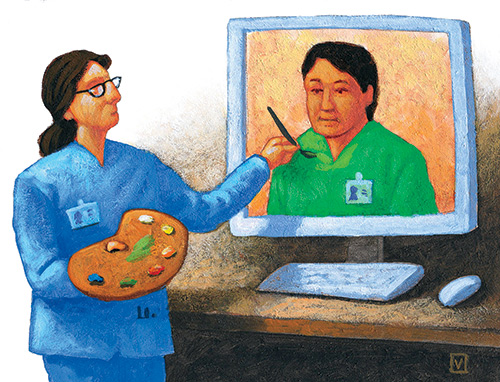
Illustration: Paul Vismara
Brooklyn-based nurse Ursula-Pearl Nwabueze, who teaches in the City University of New York’s College of Technology, sought two things in a nursing education doctoral program: freedom to keep working and sharper classroom, clinical and lab skills.
“There are not many programs aimed at teaching teachers how to teach,” she says.

Nurse educators have one of the hardest jobs in higher education. Often, aspiring nurses have no college degree, are young, naive and very inexperienced.”
—Kathleen O’Connell, Isabel Maitland Stewart Professor of Nursing Education
Enter Teachers College’s new nursing education doctoral program, launched this fall with Nwabueze in its inaugural cohort. The new program is offered fully online to students with a master’s degree in nursing who want to become leaders in the academic or health care setting without missing a beat on the job.
“TC’s program is truly unique in that students engage in scholarly discussions, interactive classes and collaborative research projects through an online environment,” says lecturer Tresa Dusaj.
More than 60 percent of registered nurses-in-training lack a bachelor’s degree.
“Nurse educators have one of the hardest jobs in higher education,” says Professor Kathleen O’Connell, the program’s creator and founding director. “Often, aspiring nurses have no college degree, are young, naive and very inexperienced. The job of the nurse educator is to turn them into safe and responsible professionals in a very short time.”
TC launched the nation’s first university-based nursing education program in 1898 and produced thousands of leading nurse educators. Nursing schools subsequently took over preparation of nurse educators — but with 1,200-plus nursing faculty vacancies nationwide due to a lack of candidates with doctoral degrees, there’s growing sentiment that education schools should resume “teaching the teachers.” With that goal in mind, the Jonas Center for Nursing and Veterans Healthcare awarded scholarships to four students in TC’s new program — the first time the Center is funding education school students.
“I believe this program will affect how nurses are taught,” O’Connell adds. “I hope students take what they learn here, continue to further the profession’s research and become leaders in their schools and in their fields.”